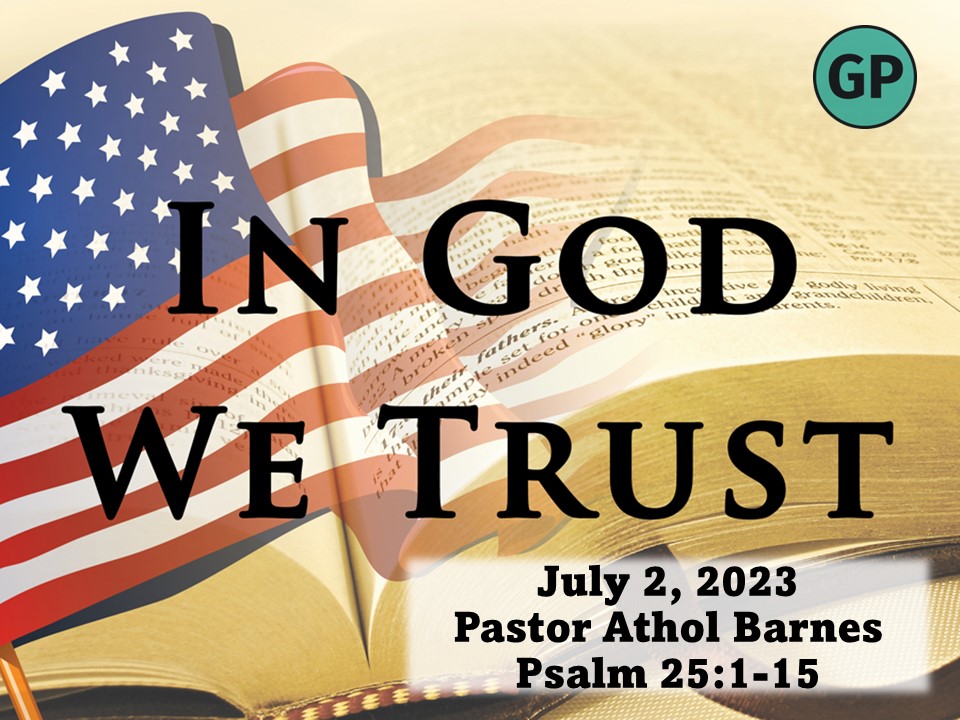
“In God we Trust”. It is the official national motto, signed into law in 1956.
The sad irony is that in our nation today, few people really trust in God. Many people say that they have faith in God, but their actions and lifestyle show that they do not trust God.
In Psalm 25, David is crying out to God for direction, and in verse 2 he states, “O my God, in You I trust…”. And then in verse 3 he says, “Indeed, none who wait for you shall be put to shame…” Waiting on the Lord is the equivalent of trusting in Him. It is actively trusting the Lord, waiting on Him to reveal His plans. Choosing to wait on the Lord and not run ahead of him, that is trusting in the Lord.
In verse 4 and 5, David asks the Lord to show him the way he should go. He is prepared to wait all day for the Lord. David acknowledges that he doesn’t have the ability to move forward, he is pleading with the Lord for direction. How often do we cry out to God like this for our future? Do we know what it is to wait on the Lord? Or do we offer a 30 second prayer and then rush out and make our own plans, hoping that God will bless it.
We read in verse 9, “He leads the humble in justice, and He teaches the humble His way.”
Now we know that in order to trust God we need come before him humbly and acknowledge our weakness. But the word “humble” in the Hebrew could also mean, afflicted or broken.
We tend to think of being humble as a posture that we present to God in the way of our attitude, but rather David describes being afflicted and humbled by God. We don’t like the sound of that. David was pleading with God to teach him, and the humbling process was the way God taught David dependence on Him.
By God’s Grace he does that to all of us, when we are brought to the place where we realize we have nothing to offer and are humbled in the presence of the almighty God.
Part of learning to be directed by God, begins with the fear of the Lord (see verses 12,14 and Psalm 111:10). To fear the Lord is a theme throughout the Old Testament.
Fearing the Lord means to be in reverent awe of His holiness, to give Him complete reverence and to honor Him as the God of great glory and majesty. This will bring us into a position of understanding and wisdom, which is knowledge given by God. Only as we truly fear the Lord will we be freed from all destructive and satanic fears.
In verse 15 David declared, “My eyes are ever toward the Lord, for he will pluck my feet out of the net.” David trusted God to deliver him when he was in trouble. Do we know how to trust in God when we face trouble? (See Psalm 91:2).
Jesus died for our sins and rose again from the dead to free us from the power of sin and death. We have a risen savior that rules today at the right hand of the Father. Our struggles today are temporary and fleeting in the light of eternity.
We look around and we see a nation that is very different to the one we knew 20 years ago. However, nothing that is happening today or will happen tomorrow will ever shake God or surprise Him. And along with that, the church, the body of Christ that is built on the foundation of the Word of God will never be shaken.
“The grass withers and the flowers fall, but the word of our God stands forever.” Isaiah 40:8.
In order to put our trust in the word of God, we need to know the word of God and meditate on the word of God. What a privilege we must open the Bible and allow the Holy Spirit to reveal truths to us. The Bible is a sure foundation that will not be shaken in an ever-changing world.
When we see the changes taking place around us, we need to be drawn to our knees to pray for our country. We weep and mourn as we see changes that seem to be out of our control, but we are not a people without hope. If you know Jesus as your Lord and Savior, and have a growing relationship with him, you are part of another Kingdom, the Kingdom of Heaven. This kingdom will endure forever (see Psalm 145:13).
Matt Chandler once said, “The Kingdom of God wasn’t born on the Fourth of July.”
Do you trust in God?


